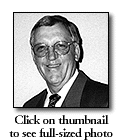Raymond G. Eberhard
California Department of Education, Sacramento
State Administrator, Adult Education Policy and Planning Unit
Director, High Risk Youth Unit
Program Manager, Youth Employment Linkages Service
Assistant Director, Office of Employment Preparation
Assistant Director, Adult Education Unit
Consultant and Administrative Assistant, Adult Education Unit
1976 - Present
Simi Valley Unified School District
Assistant Director for Adult Education
1970 - 1976
Los Angeles Unified School District
Instructor and Registrar, Chatsworth High School
Administrator, Stoney Pointe Continuation High School
1964 - 1970
Roles of state and local agencies in adult education.
Excerpt from an interview with:
RAYMOND G.EBERHARD by CUBA Z.MILLER
December 7 and 13, 1995
Sacramento, California
MILLER:
Okay.Ray, sometimes people in the field get frustrated with the Adult Ed Unit
because they don't perceive the unit as being advocates for them in Sacramento,
or an advocate for whatever their needs may be.Can you talk a little bit about
the limitations that are on you and your consultants, and what you can and
cannot do, and generally how you handle or what can be done to relieve these
periods of tension that crop up between the field and the state ?
EBERHARD:
Well, it's important to set the framework, I think, for any remarks I might
make about that. [It] is that the state has a different role than local school
districts have.We, by nature of being a state organization and part of state
government, have oversight responsibilities, which means that one of our jobs
as stewards of half a billion dollars is to make sure that that money is spent
according to law and regulation. And oftentimes it's the part of a local
provider or practitioner to spend that money as flexibly and creatively as
possible, and therein lies a dissonance by definition, which often puts us at
odds with the field, as it should be.If we see something wrong, through our
eyes, and it's verified and validated, we must then call that and say, "That's
wrong and thou shalt not do that." That is often perceived as being a
non-advocate[chuckling], but also on the other hand, that's what our job is,
part of our job.
Another major part of that is that we have a different set of eyes than the field has. When we open our eyes at eight o'clock in the morning in our office, we see the entire state, which means I see little teeny programs up in Susanville and Shasta and the Trinity Alps and down in the desert communities, and I see Los Angeles and I see Fresno, and everything in between.When the field opens its eyes at eight o'clock in the morning, they see their community. And that is a very different perspective, as it should be, by definition, and therein lies, I believe, another part of this comment about " Well, you don't advocate for us." We have to advocate for an entire state.And if, in fact, taking a position in support of a small piece of that state's geography is not in the best interest of the state, then in fact we are not an advocate for that small little piece of geography.So those are historic problems, and by definition and function they are not going to go away. They're going to stay there because of the different roles and different perspectives that the two have.

